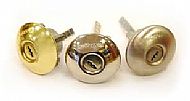INSURANCE APPROVED LOCKS


Do you know what locks you have fitted on your doors? No? Well, you're not alone. The vast majority of householders haven't a clue whether or not their locks measure up to their insurance company's standards. Most blithely assume that they do meet the standards required by their insurance company. The truth is that many of these locks do not, and it's your locks that could be the undoing of a successful claim.
My insurance says I need a 5-lever deadlock (BS3621). What is that?
The 5 lever lock is a type of lock often required for home insurance and often recommended by the police for home security. Deadlock means the lock-bolt is not held in the keep by a spring. A deadlock is extended manually, usually by a key and can only be retracted in the same way. 'Five-lever' refers to the number of levers that prevent the lock opening in the absence of the true key. The more levers there are, the harder it is to pick. BS3621 is the standard given to these types of locks by the British Standards Institute.
My insurance says my locks must be British Standard. What does this mean and how do I know if my locks are British Standard?
British Standard locks (BS EN 1303) is the minimum standard for the cylinder on locks for multi-point locking on external or entrance doors. Of course, the effectiveness of the lock depends on the quality of the door, frame and other hardware which is not tested by this standard and which may fail before the lock cylinder.
On lever locks, the British Standard kitemark is clearly stamped into the face. If it isn't then the chances are it's not British Standard and your insurer may refuse to pay out if you make a claim.
On cylinder locks, the stamping of the Kitemark is a relatively new requirement. Therefore, your locks may be British Standard but there is no way of telling. The bottom line is, if your insurance company requires you to have British Standard kitemarked locks front and back, and there is no visible sign of a kitemark, your insurer may not pay out should you be burgled through the door.
Wooden and UPVC doors.
If you have a wooden door(s), insurance companies will require that you have a British Standard five-lever deadlock fitted along with a nightlatch – a typical 'Yale' lock. A nightlatch lock has pin tumblers which are not particularly secure, whereas a five-lever lock has five levers, making it much more secure.
If you have a UPVC door then it will likely have a multi-point locking system. UPVC doors are not secure until the multi-point locking system is locked, usually by lifting the handle and turning the key. The key must be turned in the lock to ensure the door is bolted – just closing the door and using the latch will not provide adequate security. If the handle doesn't lift, you will probably need to double lock the door, otherwise it could be fairly easy to force open.
What's My advice?
Dull as it might be, read your insurance policy carefully and check what the requirements are with regards to the locks on your doors, and even windows. Ask your insurance provider to send you detailed information about the lock types they require. Many will be able to send you this. Remember, not all policies are the same and, likewise, not all doors and locks are the same.
The information given here may not be specific enough for your type of doors/locks and we strongly recommend you familiarise yourself with the specific requirements of your insurer provider.
Locksmith Training Merseyside provides a wide range of high quality, BSI approved locks and we can also install them for you. We will always advise on the best locks to suit your requirements and we would never sell you something you do not need. Feel free to get in touch if you would like any further information!
Security Products.
Alarms & Alert systems
Doors & Windows
Garage & Garden
Locks, Keys & Chains
Locksmith Services
Personal Safety
Safes









